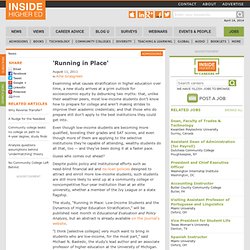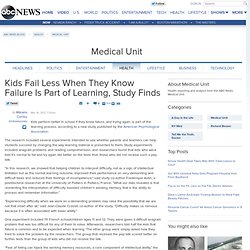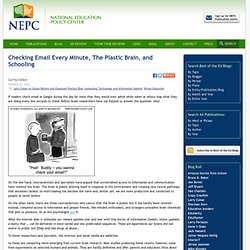

Scientific Validation & Peer-Review Articles. What do you get by letting go of your stuff? Why Flip The Classroom When We Can Make It Do Cartwheels? We all know what a traditional college classroom looks like: students in rows stare glassy-eyed at the professor who drones on, paying more attention to the equations he’s writing on the board than the students he’s supposed to be teaching.

No wonder many are proposing using digital technology to “flip” the classroom. 'Running in Place' Examining what causes stratification in higher education over time, a new study arrives at a grim outlook for socioeconomic equity by debunking two myths: that, unlike their wealthier peers, most low-income students don’t know how to prepare for college and aren’t making strides to improve their academic credentials; and that those who do prepare still don’t apply to the best institutions they could get into.

Even though low-income students are becoming more qualified, boosting their grades and SAT scores, and even though more of them are applying to the selective institutions they’re capable of attending, wealthy students do all that, too -- and they’ve been doing it at a faster pace. Guess who comes out ahead? The study, “Running in Place: Low-Income Students and the Dynamics of Higher Education Stratification,” will be published next month in Educational Evaluation and Policy Analysis, but an abstract is already available on the journal’s website.
Stereotype threat and growth mindset: If we tell students intelligence is malleable, are we lying? Doctors 'rewire' hands of paralysed man. Surgeons say the operation may prove to be a breakthrough for some patients paralysed by spinal cord injuries. Photograph: Antonio Olmos A man who was paralysed in a car crash four years ago has regained some use of his hands after doctors rewired the nerves in his arms. In a pioneering operation, US doctors took healthy nerves from the man and used them to bridge the damaged wiring that stopped signals getting from the man's brain to his hands. Surgeons at Washington University's school of medicine said the operation may prove to be a breakthrough for some patients paralysed by spinal cord injuries. To a Beginner, Anything Is Possible.
How stress affects the body. Kids Fail Less When They Know Failure Is Part of Learning, Study Finds. Mar 14, 2012 7:00am Kids perform better in school if they know failure, and trying again, is part of the learning process, according to a new study published by the American Psychological Association.

The research included several experiments intended to see whether parents and teachers can help students succeed by changing the way learning material is presented to them. Study experiments included anagram problems and reading comprehension, and researchers found that kids who were told it’s normal to fail and try again did better on the tests than those who did not receive such a pep talk. To perform with less effort, practice beyond perfection. Feb. 9, 2012 — Whether you are an athlete, a musician or a stroke patient learning to walk again, practice can make perfect, but more practice may make you more efficient, according to a surprising new University of Colorado Boulder study.

The study, led by CU-Boulder Assistant Professor Alaa Ahmed, looked at how test subjects learned particular arm-reaching movements using a robotic arm. The results showed that even after a reaching task had been learned and the corresponding decrease in muscle activity had reached a stable state, the overall energy costs to the test subjects continued to decrease. By the end of the task, the net metabolic cost as measured by oxygen consumption and carbon dioxide exhalation had decreased by about 20 percent, she said. "The message from this study is that in order to perform with less effort, keep on practicing, even after it seems as if the task has been learned," said Ahmed of CU-Boulder's integrative physiology department. Story Source: Books vs. screens: Which should your kids be reading? Last week, Canadian author Margaret Atwood thrilled her 285,000-plus Twitter followers by defending their kind as “dedicated readers” who are boldly exploring new frontiers in literacy.

Checking Email Every Minute, The Plastic Brain, and Schooling. If readers check email or Google during the day far more than they would ever admit while sober–or others stop what they are doing every few seconds to check Twitter–brain researchers have not helped us answer the question: why?

On the one hand, neuroscientists and journalists have argued that unrestrained access to information and communication have rewired the brain. The brain is plastic altering itself in response to the environment and creating new neural pathways that ancestors lacked. 15 Big Ways The Internet Is Changing Our Brain. Noted science-fiction writer Isaac Asimov predicted that one day, we'd "have computer outlets in every home, each of them hooked up to enormous libraries where anyone can ask any question and be given answers, be given reference materials, be something you're interested in knowing, from an early age, however silly it might seem to someone else," and with this appliance, be able to truly enjoy learning instead of being forced to learn mundane facts and figures.
